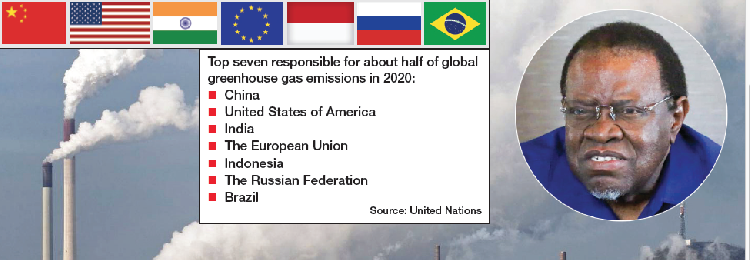Geingob bashes rich nations for polluting the world – The Namibian
PRESIDENT Hagegeob has criticized wealthy countries for creating the climate crisis, and being untruthful regarding the fight against it.
On the sidelines of the ongoing 27th Conference of the Parties to the United Nations (UN) Framework Convention on Climate Change (COP27) in Egypt, Geingob was quoted by the BBC saying wealthier nations have turned climate conferences into “talking shops”.
COP27, the 27th UN climate change conference, began on 6 November in Sharm el Sheikh and will continue until 18 November.
Geingob, according to BBC, described the world’s biggest polluters as criminals and Third-World countries as their victims.
Alfredo Hengari, the presidential spokesperson, said yesterday that Geingob meant to say that pollution is a criminal act because of its effect on people and the environment.
“There is an important nuance that we must all grasp beyond the crass and crude interpretation you want to graft into the usage of the word (criminal), which is essentially to refer to high levels of pollution that can be equated to criminal activity in light of the dangers this poses to people and the planet,” Hengari said.
Malawi’s president, Lazarus Chakwera, this week also criticised wealthier nations by saying: “ . . . we believe that the clear difference in the culpability and capacity between developed nations must be reflected in the level of responsibility they bear for climate mitigation, adaptation and financing.”
The Natural Resources Defence Council reported earlier this year that the most vulnerable countries, namely the United States (US), and Western European nations, have emitted the largest amount of greenhouse gases, which has contributed to the climate crisis.
Only 23 countries are responsible for half the historical carbon dioxide emissions. Yet, developing nations are most affected and least prepared to deal with the consequences.
This is why rich nations made a commitment at the 2009 UN Climate Summit, or COP15 in Copenhagen, Denmark.
They agreed to mobilize US$100 billion annually, officially starting in 2020, to support developing countries in reducing their carbon emissions and adapting to the effects of climate change.
GRANTS and LOANS
Geingob made a prepared statement at COP27 on Tuesday and asked First-World nations to help develop countries with climate change-related project funding.
“Namibia encourages developed countries to support developing countries by capitalising the Green Climate Fund,” Geingob said.
He said Namibia was joining the rest of Developing World countries and a larger community of nations to appeal for sustained efforts to achieve the global goal of global temperature reductions not exceeding 1.5 degrees Celsius.
This week, the Namibian delegation received concessionary loans and grants in the amount of N$10.6 billion at COP27 to help develop the country’s green economy and blue economy.
These include a N$767million government award from Invest International, a N$89.7 million grant from European Investment Bank, and a N$179million grant to Hyphen Hydrogen Energy.
Hyphen also received N$448m concessionary loan during its feasibility study. Hydrogene France (HDF), a major French independent power producer, received N$179m loan for its utility scale solar hydrogen project.
The European Investment Bank also granted a concessional loan to the government in the amount of N$8,9 billion.
According to James Mnyupe (presidential financial adviser, and hydrogen commissioner), the terms of this agreement are still being worked out.
SCEPTICISM
Experts were skeptical about the N$106,000 billion in grants and concessional loans Namibia received.
“It is mind-boggling that you borrow from the Europeans to supply them with gas and pay them to get energy sources from you. This reminds me of Trump’s wall: ‘I will build the wall, and Mexico will pay for it’,” local economist Omu Kakujaha-Matundu said this week.
He said that loans should not have to be approved without parliamentary approval and that foreign loans are especially dangerous for both economic and political reasons.
“This madness of loans being concluded without the blessing of parliament is just unacceptable. The supreme representative of Namibian citizens is Parliament. Not the executive,” Kakujaha-Matundu said.
He stated that in a country where projects are exceeding initial estimates, Geingob should assure taxpayers the green hydrogen project will not be overpriced once it starts.
He asked the Presidency for transparency on which loans and grants would be equity-financed and which would be financed with debt.
Eneas Evula, spokesperson for Landless People’s Movement, stated that the climate-change conference has become a playground where European countries can suppress African countries and force them to make unsustainable deals.
“African leaders should stop allowing themselves to be put on a leash by these so-called developed nations. It’s a continued insult to our dignity and pride as Africans,” Emvula said.
He stated that the Presidency should be practicing good governance and not accumulating loans to finance projects that are often misguided and leave the economy stranded as a result.
“The fact that we fail to secure loans based on true commercial conditions in the market leaves a serious bad taste and an indication that we are considered delinquent and not worthy of dealing with on business principled terms, but rather fitting to be fed as second-class borrowers,” Emvula said.
McHenry Venaani, leader of the Popular Democratic Movement, welcomed the loans and grants but warned against innate corruption.
“We welcome the development, but caution on the corrupt deals downstream that are seeing certain people enriching themselves. I call on president Geingob to curb that corruption,” Venaani said.
BBC – Additional source
Source: namibian
